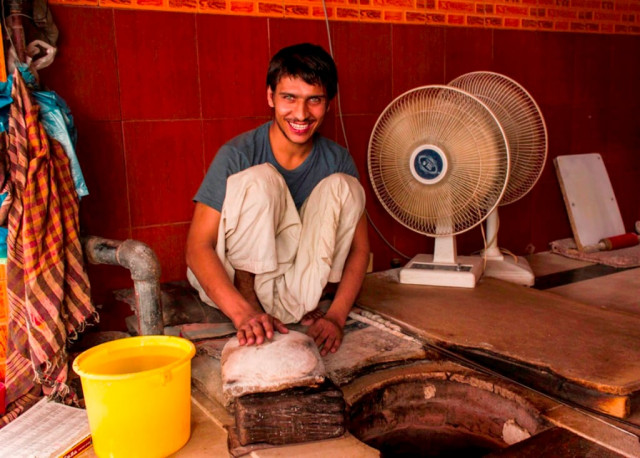International Migrants Day: When there’s more than one home
Migrant communities often face problems like discrimination running through generations.

An Afghan smiles as he prepares roti. PHOTO: AYESHA AKIF
“Pakistan is where I was born. My childhood was spent here,” says Mohammad Saad Sharif, a biomedical engineer at Patel Hospital. Sharif is originally from the community of Malabari- people from the Kerala region of India who migrated to Pakistan after Partition. He still has relatives in Kerala, and when it comes to leaving Pakistan, Sharif is not in favour. International Migrants Day is celebrated worldwide on the 18th of December to celebrate the contributions, struggles and rights of migrant communities.
According to United Nations, migrants make up to 2.2% of the entire population of our country. However, Pakistan has recorded large declines in the size of migrant stocks between 1990 and 2013, states another UN report. While the UN says there are 1.6 million registered Afghans, the CIA Factbook states that there are 1.9 million registered and one million undocumented Afghans, while around 758,000 people are internally displaced. Thus, Pakistan, as a result of migrations, has a rich and diverse culture.
Karachi, in particular, seems a hub of migrants. What is unique about Karachi is that majority of its population, approximately 90%, comprises migrants from diverse backgrounds says Ayesha Akif, a recent graduate of Indus Valley School of Art and Architecture, who based her thesis on the city home to 23.5 million people.
Her work focuses on the personal stories of migrants. She covers migrant communities in 15 postcards. Each postcard has a photograph she took herself and a small introduction to the community on the back. Akif is not the only artist who has covered the diversity migrants lend to Karachi in her work.
“From our childhood till now, we have only been hearing about certain ethnicities in Pakistan, but the fact is there are so many more people around us with such varying backgrounds. We need to teach about these communities in schools, make people talk about them and have things written about them,” says author Rumana Husain who wrote a book titled “KarachiWala: A Subcontinent within a City” based on stories of 64 migrants in Karachi, covering roughly about 40 communities. Husain has her reservations with the way the media and the textbooks portray the different communities of the country. “I’m a firm believer that the richness of this diversity should be celebrated,” says Husain.
Yet, migration comes with certain questions that at times remain unanswered. “I am still confused. We don’t know what to call ourselves, should we call ourselves Zanzibaris, Pakistanis or East Africans?” said Farida Ali to Akif while she was doing her thesis. Ali migrated from Nairobi, Kenya, in 1961 after the revolution in Africa made it hard for Asians to live there, and she became one of the four million international migrants currently residing in Pakistan.
People like Sharif have a different take on the celebration of migrants’ day. “You should become a Pakistani when you come to Pakistan. There is no need to divide people on this basis,” he states.
While Pakistan boasts a variety of different communities moving in, there are also a considerable number of people leaving the country.
“Pakistani immigrants do not get the same respect as natives of the countries they move to. They face discrimination at every stage. Their background and their history is inspected. Even in hostels and for medical purposes, the first look they get is undermining,” says Zainab Malik, the Public Relations Officer at Immigration Advisory Service (IAS). “But a lot of people are willing to compromise on their nationality for the sake of good education or better business opportunities,” she adds, explaining that her organisation helps immigrants in gaining the respect they deserve away from home.
For 25-year-old Faizan Arshad, moving to the UK was about finding a better opportunity for career growth and an ‘unprecedented exposure’ but most importantly for security concerns. “I am being offered a better life, most importantly in terms of peace of mind,” he says.
According to data provided by IAS, the highest number of registered Pakistani workers in 2013 were in Saudi Arabia, followed by UAE.
Currently, International Migrants Day is being marked in the UK to help the migrant communities come together, to know each other better and to gain the respect they deserve, says Malik. “But unfortunately, there is no such platform in Pakistan to help the migrant communities residing in the country.”
Published in The Express Tribune, December 17th, 2013.
Slideshow: When there's more than one home.



















COMMENTS
Comments are moderated and generally will be posted if they are on-topic and not abusive.
For more information, please see our Comments FAQ